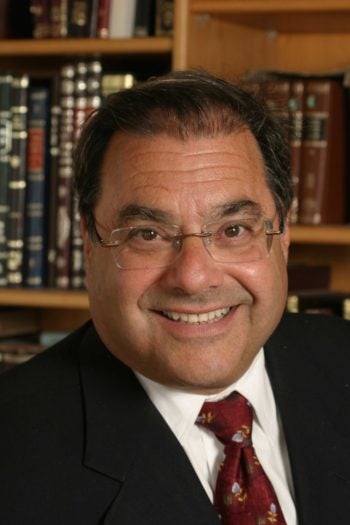From the Archive: Rabbi Shlomo Riskin’s presidential criticism and retracted statements
Published April 2, 2015

In 1980, Rabbi Shlomo Riskin said President Jimmy Carter was “selling out” Israel. (Wikimedia Commons)
Last weekend Shlomo Riskin, the chief rabbi of Efrat, compared Obama to the biblical villain Haman — but a few days later he modified his assessment, saying that Iran, not Obama, was Haman.
It wasn’t the American-born rabbi’s first harsh critique of a sitting U.S. president. In 1980, when Riskin was the spiritual leader of New York’s modern Orthodox Lincoln Square Synagogue, he described his plans to make aliyah and help establish new immigrant communities in the West Bank as a “response to President [Jimmy] Carter’s sellout of Israel …”
In particular, he was referring to Carter’s affirmative vote for a United Nations Security Council resolution condemning Israel’s settlement activity in the West Bank and eastern Jerusalem.
The Haman-Obama about-face also wasn’t the first time Riskin made a provocative comment, only to walk it back a few days later. In 1995, he suggested in a New York news conference that American Jews should stop contributing to the United Jewish Appeal and other agencies connected to the Israeli government as a way of protesting Israeli government efforts to freeze settlement expansion. The next week he apologized:
“I don’t believe that we shouldn’t give to UJA,” he said in a telephone interview from the West Bank settlement of Efrat.
“If it came out that way, then I’m sorry,” he said.
Riskin’s initial statement on the UJA came after the Israeli government, under Prime Minister Yitzhak Rabin, nixed expansion plans for Efrat “after Palestinians and left-wing Israelis protested the expansion and warned that it could disrupt the peace process,” JTA reported.
Although the government reached a compromise, allowing Efrat’s leaders “to expand on land closer to their community,” Riskin “took a hard line” against Rabin’s coalition and “predicted an all-out war if the government continued to halt expansion of settlements,” JTA wrote.
Saying his remarks about UJA “came out wrong” at the news conference in New York, Riskin noted that his own Ohr Torah Educational Institutions in Jerusalem are helped by UJA funds.
At the same time, however, Riskin, in the phone interview, reiterated the position he articulated at the news conference that American Jews should give directly to projects in the territories.
![]()















